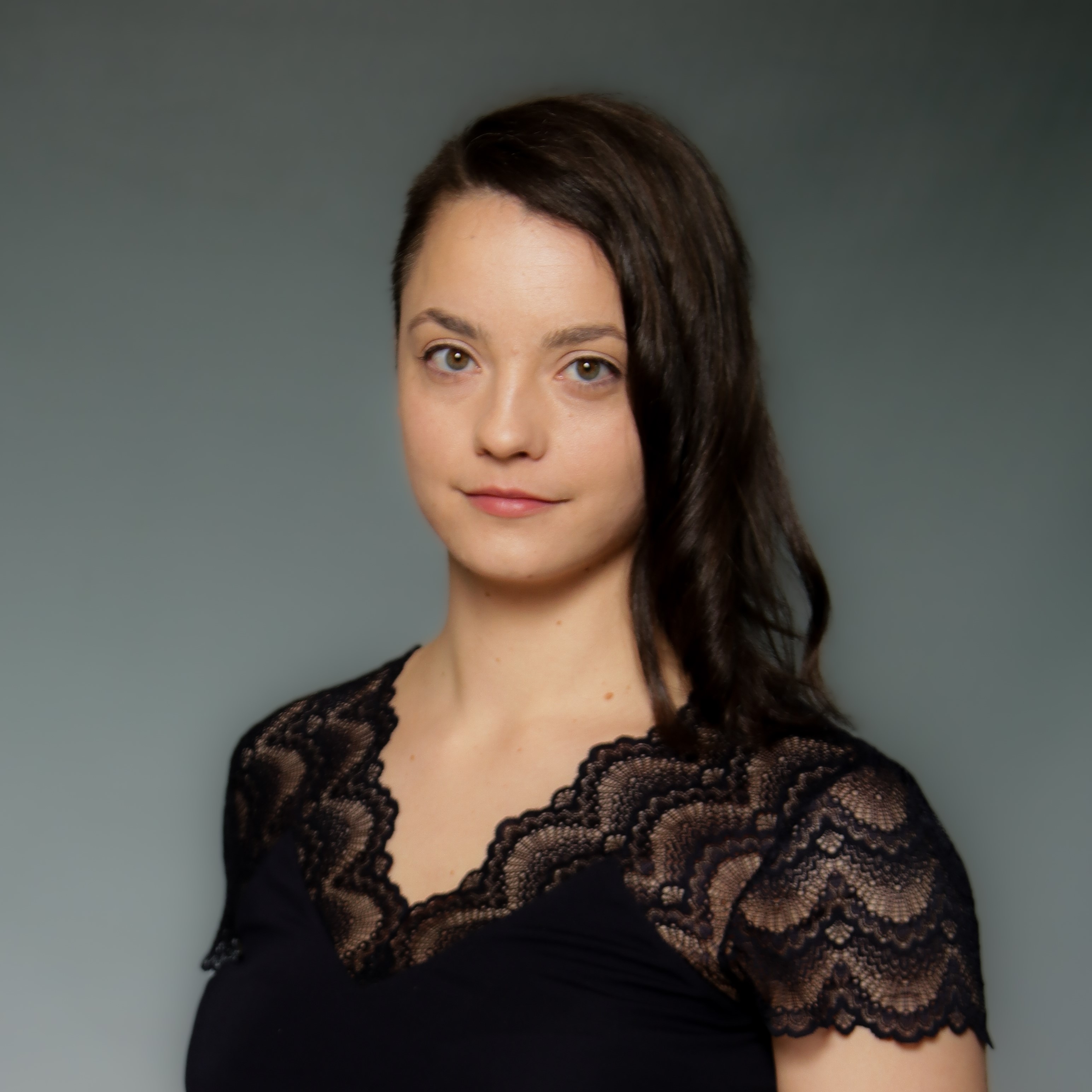Gender & Diversity Consulting
for third party funded research networks
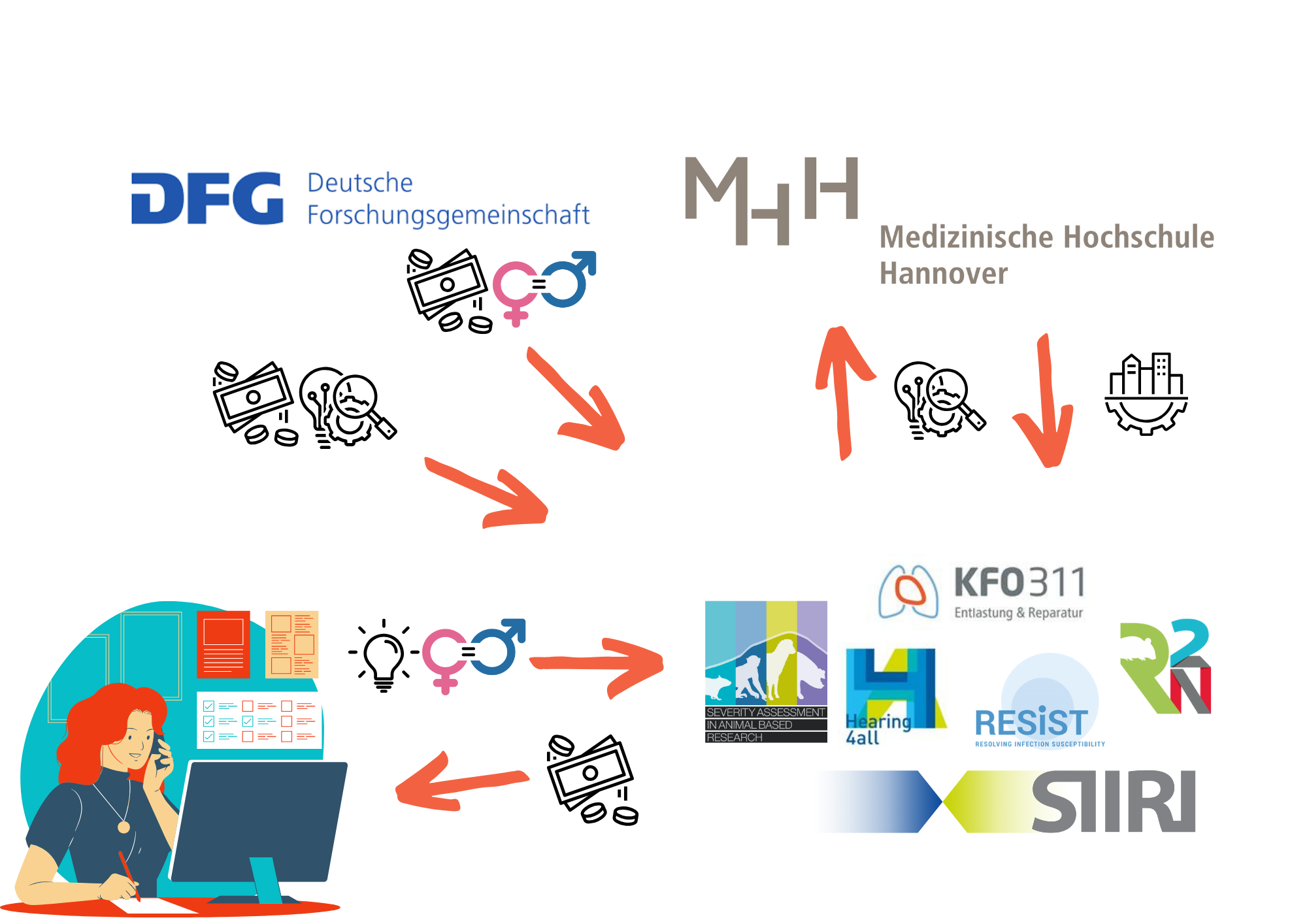
The research networks based at the MHH not only receive funding for research, but also an equal opportunities allowance. This is used to finance measures that serve to promote diversity by supporting certain groups of scientists and reducing discrimination and disadvantage through awareness-raising measures.
The support can take the form of childcare, workshops on career development, individual coaching and advice. It is aimed at women and people from marginalized groups, e.g. people affected by racism, ableism, queer hostility, etc.
At the MHH, the funds are used efficiently in the form of a so-called “pooling” model: the associations jointly pay the personnel costs of the Gender & Diversity Consulting position, and mixed participation in the workshops also contributes to networking.
In addition, the Gender & Diversity Consulting service also offers advice to the groups: the application advice is tailored to meet the criteria of the third-party funding bodies to the highest degree.
Further information about the DFG's equal opportunities funding can be found here: https://www.dfg.de/de/grundlagen-themen/grundlagen-und-prinzipien-der-foerderung/chancengleichheit
Current Program
Coaching for women and people from marginalized groups*
Do you have questions about your career planning, balancing work and family, or other topics and hurdles you face in your professional life?
Personal coaching can help you get an overview and consider various options when making important decisions. Coaching sessions can be held in German or English with any of the coaches.
Please feel free to contact me (Johanna Prien-Kaplan, prien-kaplan.johanna@mh-hannover.de; 532-84080) to make an appointment or to clarify any questions you may have about coaching.
This refers to persons who experience structural discrimination based on age, gender, (presumed) ethnic origin and nationality, sexual orientation, health, social background, religion/belief. If you are not sure whether you belong to this group, please feel free to contact me!
Our coaches
Susanne Klyk, Equal Opportunities Officer at MHH. Focus: dual career, leadership, compatibility, self and time management, conflicts, cooperation in heterogeneous teams.
Julia Männel, psychologist and career consultant. Focus: professional orientation, communication, self and time management, compatibility, potential analysis. https://www.linkedin.com/in/julia-m%C3%A4nnel/
Anna Brandes, mediator, moderator, coach. Focus: career counseling, decision-making, self- and time management, communication. https://waldlichtung.com/
Dr. Phuong Glaser, coach, research manager. Focus: career counseling for international researchers, communication, collaboration in heterogeneous teams. https://transition-and-grow.com/

Workshop Inhalte
Der Alltag in der Wissenschaft ist so schon herausfordernd! Rassifizierten Menschen werden regelmäßig extra Grenzen aufgezeigt – auch innerhalb der eigenen Disziplin. Ob Forschungsgegenstände und -lücken, oder einfach der Umgang mit Kolleg:innen im hierarchischen Setting. Du suchst das Allheilmittel dagegen? Wir auch. Während es weiter brodelt in der Gemeinschaftsküche konzentrieren wir uns auf das, worauf wir jetzt schon Einfluss haben: Wir kommen zusammen, sammeln Kraft und polieren unsere Stärken. Wir bündeln und teilen unsere Strategien im Umgang mit Rassismus im Alltag und am Arbeitsplatz. Bist du mit dabei?
Die Trainer:innen
Joanna Mechnich arbeitet zu den Themen Rassismuskritik, Intersektionalität, Empowerment und Afrofuturismus. In dieser Tätigkeit begleitet Joanna Menschen im Umgang mit und zu der eigenen Verflochtenheit in gesellschaftliche Machtstrukturen. Empowerment gehört für Joanna untrennbar zu dieser Arbeit. Afrofuturismus ist eine Leidenschaft und Perspektive von Joanna. https://www.linkedin.com/in/joanna-mechnich-158531101/
Viviann Moana Wilmot
https://de.linkedin.com/in/viviann-moana-wilmot-4a68b2200
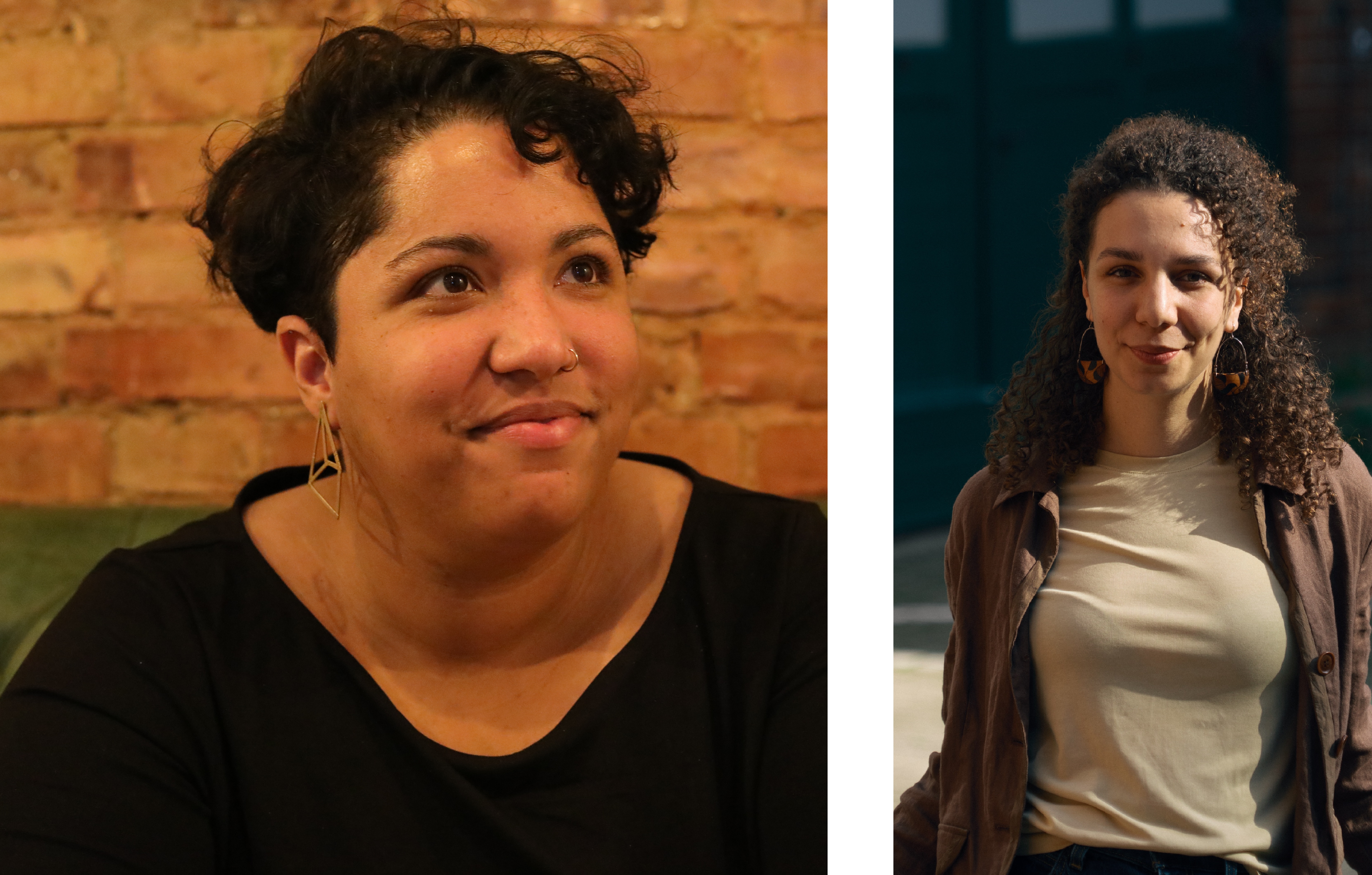
Zielgruppe
Personen, die negativ von Rassismus betroffen sind, also z.B. Menschen mit eigener oder familiärer Migrationsgeschichte („Migrationshintergrund“), Schwarze Menschen, Sinti_zze und Rom_nja, BlPoC, …
Du bist dir unsicher, ob du Teil der Zielgruppe bist? Kein Problem, frag einfach die Veranstalter:innen!
Details und Anmeldung
16.05.2025, 09-16 Uhr, tba
Anmeldung per Email an chancengleichheit@mh-hannover.de; bitte geben Sie Ihren Forschungsverbund mit an!
Content:
Everyday life as a scientist is challenging. At the same time racialized scientists encounter additional barriers – both within and without their particular discipline. Whether it be research topics or gaps, or encounters with colleagues in a hierarchical setting. Are you looking for a panacea? So are we. But while the fight for systemic change continues, let us, for now, focus on our more immediate context: By coming together and showing up for each other we’ll gather our strengths and share our strategies for dealing with racism in everyday life and in the workplace. Sounds interesting? Come and join us!
The trainers:
Joanna Mechnich works on the topics of racism critique, intersectionality, empowerment and Afrofuturism. In this work, Joanna accompanies people in dealing with and dealing with their own entanglement in social power structures. For Joanna, empowerment is an inseparable part of this work. Afrofuturism is a passion and perspective for Joanna. https://www.linkedin.com/in/joanna-mechnich-158531101/
Viviann Moana Wilmot
https://de.linkedin.com/in/viviann-moana-wilmot-4a68b2200

Target group
People who experience racism, e.g. Black people, Sinti_zze and Rom_nja, first or second generation migrants (“migration background”), BlPoC, …
You’re not sure this is for you? Don’t hesitate to ask!
Details and registration
June 27th 2025, 9am-4pm, room tba
Registration via email to chancengleichheit@mh-hannover.de, please mention the name of your research network!
Content
Outside of academic research, suitability predictions about candidates are only made to a small extent on the basis of previous professional training and qualifications. Personality traits and the ability to interact with others play an important role.
The aim of this workshop is to make participants aware of what is expected of them and why they need to prepare for it. They will be given an overview of different career options in the public, private and non-profit sectors. Fields of activity and job profiles will be presented in more detail based on their requirements for the personality of the job holder. In the second part, participants are supported in examining their own personality profile and motives in order to decide which activities suit them best.
To discuss your very own career path, an individual coaching can be booked as a follow up to the workshop. (Cost will be covered by your research network.)
The trainer
Gaby Schilling holds a PhD in chemistry and a BSc. in psychology. She worked for over 17 years in various management positions at a DAX 30 company in Germany and the USA, leading teams of experts and managers and gaining extensive experience in all phases of working with employees - from recruitment to development, promotion and promotion to change. Ms. Schilling has supplemented her practical experience with training as a business, career and team coach, trainer and e-tutor. She has been self-employed since 2012, coaching scientists and training groups of doctoral candidates and postdocs. Her focus is on the transition from academia to industry (positioning, orientation, application) and leadership topics.
https://www.kepos.com/de/mitarbeiter
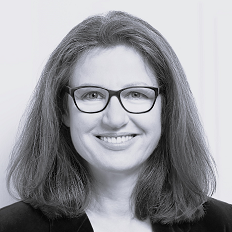
Target group
Doctoral students in the last year before completing their doctorate (late-stage PhD students) and postdocs in the first phase after their doctorate (early-stage postdocs) who are not yet clear about their career goals.
Details and registration
June 12th 2025, 9am-5pm, room tba
Registration via email to chancengleichheit@mh-hannover.de. Please state your research group and your specialist field!
Content
The workshop Scientific Writing & Publishing conveys the know-how of scientific writing & publishing and creates a basis for long-term development of participants‘ scientific writing skills. Participants learn how to write clear and wellstructured scientific texts and how to successfully publish research articles in peer-reviewed journals.
To enable maximum possible transfer of learned skills, the trainer employs interactive and collaborative methods including writing sessions, reflections, peer feedback, practical exercises, discussions with the group and in pairs, and Q&A rounds.
The trainer:
Dr. Martina Michalikova has a background in biology and computational neuroscience. She is a certified writing consultant specialized in scientific writing in English as a second language. Since 2017 she is leading workshops, retreats and writing groups in Germany, other European countries, and online. https://writingscientist.com/
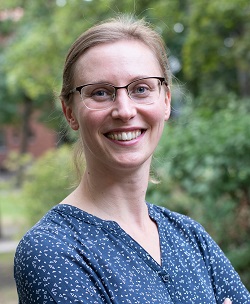
Target group:
Early career scientists who are currently writing a paper or thesis. Please bring to the course: your own recent research result in form of a figure, table or equation.
Alternatively a figure from a published, recently read paper and also one page of their own text for feedback that has not been heavily edited by others.
Details and registration
June 6th+13th+20th+ July 11th, 9am-12am, online
Please note that all four dates belong together, for a certificate you have to attend the whole series!
The last day (July 11th) takes part within the school summer break, if this poses a problem to you please contact me!
Registration via email to chancengleichheit@mh-hannover.de. Please state your research group!
Full description of the four modules:
1. General principles of (scientific) writing. Writing process. Writing productivity.
• How you can develop your writing skills "painlessly"
• What type of writer you are and how you can use your strengths to compensate for your weaknesses
• How to optimally approach the different phases of the writing process: research & prewriting, structuring, drafting, revising
• How to get into writing fast and combat writer's block
• How to write productively in a long-term, sustainable way
2. Macrostructure of research articles.
• Structure and do’s & dont’s of writing each section of a research articles
• How to write a compelling title
• How to create a storyline for your research article
• Understanding readers’ expectations and using the reader’s perspective to communicate your research findings effectively
3. Paragraph & sentence structure. Text flow. Scientific language & style.
• Paragraph structure: the key to easy-to-read texts
• Sentence structure: how to create a logical flow in your writing
• Text flow: methods to improve the readability of your text
• Scientific language & style: how to write clearly & concisely, active vs. passive voice, the importance of action verbs, and more
4. Peer feedback. Publication processes.
• Guidelines for effective peer feedback
• Peer-feedback practice
• Journal selection criteria
• Overview of the peer-review process
• Writing a cover letter
• Responding to reviewer comments
Content
The workshop Advanced Scientific Writing helps experienced writers of science at the PostDoc level and above overcome their limitations and take their writing to the next level. The goal is not only to improve the quality of produced texts, but also to make the writing process more efficient and even enjoyable. To enable maximum possible transfer of learned skills, the trainer employs interactive and collaborative methods including writing sessions, reflections, peer feedback, practical exercises, discussions with the group and in pairs, and Q&A rounds.
The trainer
Dr. Martina Michalikova has a background in biology and computational neuroscience. She is a certified writing consultant specialized in scientific writing in English as a second language. Since 2017 she is leading workshops, retreats and writing groups in Germany, other European countries, and online. https://writingscientist.com/

Target group
PostDoc level scientists.
Please bring to the course: your own recent research result in form of a figure, table or equation.
Alternatively a figure from a published, recently read paper and also one page of their own text for feedback that has not been heavily edited by others.
Details and registration
June 11th+18th+25th from 9am-12am, online
Please note: all three days belong together, for a certificate you need to participate in all three days!
Registration via email to chancengleichheit@mh-hannover.de. Please state your research group!
Content
Workshop I: German Academia – An Introduction for International Scientists
- The German academic landscape: an overview
- Career stages and requirements
- Gender-related and intersectional dynamics in academia
- Co-creation of a safe space for exchange on one’s own experience and for building possible networks among participants
- Reflection on strengths and resources as international scientists in Germany
- Development of one’s own strategies in navigating through the German academic system
The two workshops by Dr. Glaser work best in combination but can be attended individually.
The trainer
Dr. Phuong Glaser is a certified coach and trainer, specializing in career development, mentoring, and mindful communication. With a strong academic foundation in linguistics (PhD), advanced training in Applied Psychology (Cologne) and Compassion Research (Stanford), she integrates evidence-based methods from diverse fields into her work. After transitioning from academia and research, she supported international and German scientists in human resources development at the University of Cologne. Now, Phuong collaborates with universities and research institutions across Germany to guide researchers through career transitions, crosscultural dynamics, and professional growth.
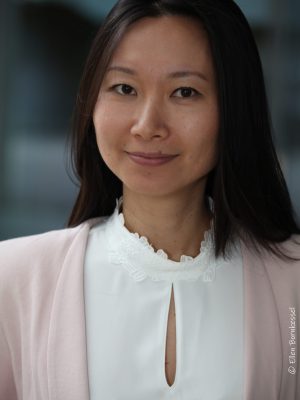
Target group
International early career scientists. Feel free to contact me or Phuong Glaser if you are not sure, which course is suitable for you.
Details and registration
September 24th, 9am-5pm; room tba
Registration via email to chancengleichheit@mh-hannover.de. Please state your research group!
Content
Workshop I: German Academia – An Introduction for International Scientists
- The German academic landscape: an overview
- Career stages and requirements
- Gender-related and intersectional dynamics in academia
- Co-creation of a safe space for exchange on one’s own experience and for building possible networks among participants
- Reflection on strengths and resources as international scientists in Germany
- Development of one’s own strategies in navigating through the German academic system
The two workshops by Dr. Glaser work best in combination but can be attended individually.
The trainer
Dr. Phuong Glaser is a certified coach and trainer, specializing in career development, mentoring, and mindful communication. With a strong academic foundation in linguistics (PhD), advanced training in Applied Psychology (Cologne) and Compassion Research (Stanford), she integrates evidence-based methods from diverse fields into her work. After transitioning from academia and research, she supported international and German scientists in human resources development at the University of Cologne. Now, Phuong collaborates with universities and research institutions across Germany to guide researchers through career transitions, crosscultural dynamics, and professional growth.

Target group
International scientists of PostDoc level and above. Feel free to contact me or Phuong Glaser if you are not sure, which course is suitable for you.
Details and registration
September 25th, 9am-5pm; room tba
Registration via email to chancengleichheit@mh-hannover.de. Please state your research group!
Content
Workshop II: Finding My Way and Developing Specific Steps towards a Scientific Career in Germany (as an International Scientist)
- Status-quo analysis and self-awareness
- Reflection on cultural dimensions of working, collaborating and doing research in Germany
- Gender specific communication (styles) and across (working) cultures
- Funding opportunities and career options
- Career resources analysis (identity, human capital, social and psychological)
- Development of an action plan
- Co-creation of a safe space and possible networks among participants
The two workshops by Dr. Glaser work best in combination but can be attended individually.
The trainer
Dr. Phuong Glaser is a certified coach and trainer, specializing in career development, mentoring, and mindful communication. With a strong academic foundation in linguistics (PhD), advanced training in Applied Psychology (Cologne) and Compassion Research (Stanford), she integrates evidence-based methods from diverse fields into her work. After transitioning from academia and research, she supported international and German scientists in human resources development at the University of Cologne. Now, Phuong collaborates with universities and research institutions across Germany to guide researchers through career transitions, crosscultural dynamics, and professional growth.

Target group
International early career scientists. Feel free to contact me or Phuong Glaser if you are not sure, which course is suitable for you.
Details and registration
November 10th, 9am-5pm, room tba
Registration via email to chancengleichheit@mh-hannover.de. Please state your research group!
Content
Workshop II: Finding My Way and Developing Specific Steps towards a Scientific Career in Germany (as an International Scientist)
- Status-quo analysis and self-awareness
- Reflection on cultural dimensions of working, collaborating and doing research in Germany
- Gender specific communication (styles) and across (working) cultures
- Funding opportunities and career options
- Career resources analysis (identity, human capital, social and psychological)
- Development of an action plan
- Co-creation of a safe space and possible networks among participants
The two workshops by Dr. Glaser work best in combination but can be attended individually.
The trainer
Dr. Phuong Glaser is a certified coach and trainer, specializing in career development, mentoring, and mindful communication. With a strong academic foundation in linguistics (PhD), advanced training in Applied Psychology (Cologne) and Compassion Research (Stanford), she integrates evidence-based methods from diverse fields into her work. After transitioning from academia and research, she supported international and German scientists in human resources development at the University of Cologne. Now, Phuong collaborates with universities and research institutions across Germany to guide researchers through career transitions, crosscultural dynamics, and professional growth.

Target group
International scientists of PostDoc level or above. Feel free to contact me or Phuong Glaser if you are not sure, which course is suitable for you.
Details and registration
November 10th, 9am-5pm, room tba
Registration via email to chancengleichheit@mh-hannover.de. Please state your research group!

